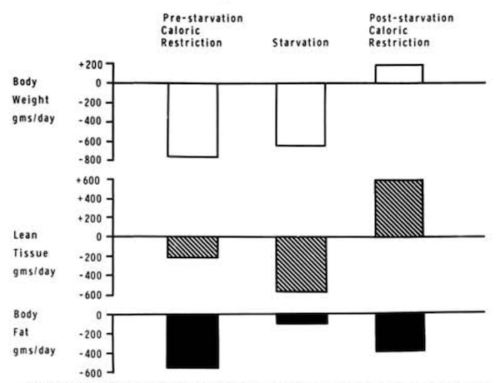Fasting has a long tradition. Water fasting has been used as a healing and spiritual cleansing tool for thousands of years. Fasting is often associated with religious or spiritual goals. But is completely abstaining from food and drink also a good way to get rid of extra pounds?
Although fasting can be understood as abstaining from certain types of food, such as meat, this time we are talking about fasting in a more traditional sense, i.e. abstaining from all food and drink except water.
Fasting as a means of weight loss
How successful is it to keep off the pounds lost through fasting?
Do both – fast and change your diet to be healthier
Fasting for health? What is safe?
Summary
Fasting as a means of weight loss
 The use of fasting as a weight loss method may not have as long and dignified a history as fasting in general, but it still dates back several decades. One reason may be that overweight and obesity are modern-day epidemics.
The use of fasting as a weight loss method may not have as long and dignified a history as fasting in general, but it still dates back several decades. One reason may be that overweight and obesity are modern-day epidemics.
I have not personally met anyone who has fasted for more than 40 days. The instances of fasting mentioned in the Bible do not significantly exceed 40 days. However the longest known documented fast lasted a full 382 days. Yes, days, not hours, or one year and 17 days.
Sounds like a pretty desperate attempt. It was a 27-year-old man who, under the supervision of doctors, lost weight from an initial 207 kg to 82 kg during this time. During this entire period, he ate nothing, was only allowed calorie-free drinks, and in addition, he took vitamins and minerals according to the results of tests and the doctors' prescription.
Longer fasts have been conducted under medical supervision. For example, a study conducted by the United States Air Force involved 25 men. Most of them were at least 45 kg overweight and had not previously been successful in losing weight using other methods. During the first few days rapid weight loss came mainly from water and 9 subjects dropped out, but those who continued lost after a few weeks fasting on average 0.5 kg of fat per day.
It sounds pretty encouraging. And besides weight loss, fasting has other positive aspects.
Fasting increases motivation to change lifestyle
Fasting can be a good source of motivation for overweight people who have lost hope. For example, in one study, overweight subjects reported after the first few days of fasting feeling good and the previously seemingly hopeless task of getting rid of excess weight seemed realistic again.
The study involved 50 people, fasting for varying lengths of time, ranging from 4 to 14 days, and an average weight loss of 1 kg per day. In addition to water, they also took multivitamins.
Hunger disappears, the head is clear and the energy level increases
Although Irritability may increase at the beginning of fasting, increased hunger, distraction, and decreased mood and work capacity, then even a fast as short as 18 hours is accompanied by negative emotions, as well as a number of positive experiencesFor example, an increased sense of accomplishment, reward, pride, and control.
After the third day of fasting, the feeling of hunger also decreases significantly, which makes to make fasting easier, than sticking to a low-calorie diet. After completing a 7-day or longer fast, it is no longer a problem to continue with an 800 kcal/day diet.
Several controlled studies confirm beneficial effects of fasting and vegetarianism on rheumatoid arthritis. Calorie restriction and intermittent fasting is associated with slowing or preventing most chronic degenerative and chronic inflammatory diseases. Intermittent fasting may also be beneficial during chemotherapy.
Various mechanisms related to fasting suggest its potential health-promoting effects, such as increased production of neurotrophic factors, reduced mitochondrial oxidative stress, overall reduction of aging-related signals, and promotion of autophagy.
How successful is it to keep off the pounds lost through fasting?
It depends on what you compare it to. If you look at results of individual fasting studies, you might think that fasting is not suitable for weight loss at all. Practically all participants achieve this in a few months previous weight.
But there are better results. In one in the intermittent fasting study, which involved over a hundred people, 43% participants were able to keep off at least some of the pounds they lost, and 17% had continued to lose weight after the study ended.
However, if we take a low-calorie diet as a comparison group, the long-term results of fasting look quite good. In the study, which compared people who fasted for a long time with those who lost weight conventionally, through calorie restriction, by the seventh year all members of the traditional weight loss group had either returned to or exceeded their starting weight. In the fasting group, only one in ten participants regained their starting weight by that time.
Most longer studies follow subjects for 3-12 months, but what about 9 years later? One the longest weight loss studies, where fasting was also studied extensively, lasted just 9 years.
In this study, the people who fasted lost the most weight, but they regained their original weight after seven years. At least, those who didn't change their eating habits did. Those who immediately switched to a healthier, plant-based, whole food diet were more likely to make lasting changes to their diet and were, on average, lighter seven years later than when they started.
The researchers point out that patients who had been obese since childhood fared the worst. They had the hardest time achieving a normal weight and keeping off the lost pounds later.
However, many patients admitted that even this temporary weight loss was worth the effort. Their health improved, their quality of life increased, they found work again, and their income increased.
In other words, if you don't change your eating habits, the pounds you lose through fasting will still come back. However, for those few who change their diet to a healthier one, achieve permanent weight loss.
Do both – fast and change your diet to be healthier
What if you could lose weight quickly by fasting and then move on to healthier eating? That would give you a faster start and increase your motivation to make healthier choices? The problem is that the pounds lost by fasting are largely an illusion.
Fasting for a week or two will result in more weight loss, but less body fat, than with more traditional weight loss methods. By eating more calories (compared to fasting), you will lose more fat. Less than half of the weight lost during the first week or two of fasting comes from fat stores.

In order to be more precise to study the effects of fasting and calorie restriction on body composition, nine obese subjects were placed in a controlled environment for 37 days.
The design of the experiment was such that for the first 14 days, the subjects were allowed to eat 800 kcal/day, followed by a 16-day water fast, after which they were on an 800 kcal/day diet for another 7 days. Body weight, body water content, muscle and fat tissue weight, and nitrogen balance were monitored during the study.
If you look at the weight of the subjects, there is no doubt about the winner. Weight fell the fastest during fasting. During the week following fasting, when only 800 kcal/day was eaten, weight gained. Both this rapid loss during fasting and the weight gain after fasting were related to changes in body water content. Namely, body water content drops sharply during fasting. For this reason, diuretics should not be used during fasting.
If we look more closely at body composition, a completely different picture emerges (see figure). During the calorie-restricted diet, over 70% of the weight lost was body fat, while during fasting, less than 15% of the weight lost was body fat. Even if we double the amount of fat lost while fasting, it is still less than if we simply restricted calories.
Fasting for health? What is safe?
Now you may be wondering how the obese people in the studies mentioned above got healthy and back to normal weight through fasting. It is true that after the third week of fasting, fat burning in obese people starts to exceed muscle loss, but is this still a safe way to get rid of excess fat?
Advocates of longer fasting praise the cleansing processes that come with fasting, but it must be acknowledged that during this cleansing the body also loses essential vitamins and minerals. As we have seen, people who are sufficiently obese can fast for up to 382 days, but no one can go that long without vitamins.
For example, scurvy can be diagnosed as early as after four weeks without vitamin C. Or beriberi, an ancient disease that occurs Vitamin B1 deficiency and can occur during fasting in an even shorter time than scurvy. And once diagnosed, it can cause brain damage as early as in a matter of days, which may be irreversible.
Without supplements, a longer fast can easily end in failure. paralysis, coma or with death.
But nutrient deficiencies are not the only risk associated with fasting. As already mentioned, fasting is accompanied by a decrease in water levels in the body. There have been cases where people who have taken diuretics The fasting person died of heart failure..
Longer muscle tissue can suffer during fasting. According to popular belief, it does not affect the heart muscle, but there is reason to doubt it.
As if the above weren't enough, it turns out that the most dangerous place in a long fast is ending the fastDuring fasting, the body also loses important nutrients, including thiamine (vitamin B1) and phosphorus, which are important for metabolism. Already there is a risk after a five-day fast, that the levels of these essential nutrients are too low and returning to a regular diet immediately can end badly. The recovery period after fasting must be taken very seriously.
Speaking of the dangers associated with fasting, we can't forget to mention: who should not fastPeople with liver or kidney damage, those suffering from porphyria and uncontrolled hyperthyroidism, and of course pregnant and breastfeeding women.
Today, under the supervision of a doctor Fasting has become much saferThere are proper fasting recovery procedures, eating rules, and the ability to spot danger signs.
Fasting longer than 24 hours, especially longer than 3 days, should be done under the supervision of a doctor, as you may not be able to do all the exercises yourself. to notice or correctly interpret danger signsFor example, your the kidneys go into sodium-sparing mode during fasting, but if this fails for some reason, you can quickly develop an electrolyte anomaly, indicated only by fatigue and dizziness, which may not be noticed until it is too late.
In conclusion, to fast or not to fast?

Water fasts can be divided into different categories based on length.
- Fasts lasting less than 24 hours, such as forms of intermittent fasting, where people fast regularly for 16-18 hours a day.
- Fasts lasting 1-3 days, where the body does not yet reach a full fasting state and are therefore safer.
- Fasts lasting 4-21 days, body weight is lost mainly at the expense of water and muscle mass. Weight lost below 15% comes at the expense of fat tissue.
- Fasts of more than 21 days. Quite dangerous for a person of normal weight. For obese patients only in a controlled environment and under medical supervision.
My personal recommendation is that when you fast, choose intermittent fasting 3-7 times a week, with a 16-18 hour overnight fast. This helps keep your weight under control by consistently eating fewer calories and making the hormones that regulate your metabolism work better.
Although there are many positive aspects to prolonged fasting, it also comes with its share of risks and its effectiveness for weight loss is questionable. In any case, it is worth educating yourself and consulting your doctor before undertaking a prolonged fast.

Allan Randlepp
NutritionistAllan is a nutritionist and trainer whose favorite topics are lifestyle and longevity, including nutrition and physical activity.
Intermittent fasting – is it beneficial?





